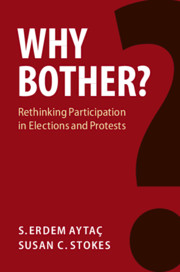
-
Select format
-
- Publisher:
- Cambridge University Press
- Publication date:
- 04 January 2019
- 10 January 2019
- ISBN:
- 9781108690416
- 9781108475228
- 9781108465946
- Dimensions:
- (228 x 152 mm)
- Weight & Pages:
- 0.37kg, 172 Pages
- Dimensions:
- (228 x 152 mm)
- Weight & Pages:
- 0.25kg, 172 Pages
You may already have access via personal or institutional login
Book description
Why do vote-suppression efforts sometimes fail? Why does police repression of demonstrators sometimes turn localized protests into massive, national movements? How do politicians and activists manipulate people's emotions to get them involved? The authors of Why Bother? offer a new theory of why people take part in collective action in politics, and test it in the contexts of voting and protesting. They develop the idea that just as there are costs of participation in politics, there are also costs of abstention - intrinsic and psychological but no less real. That abstention can be psychically costly helps explain real-world patterns that are anomalies for existing theories, such as that sometimes increases in costs of participation are followed by more participation, not less. The book draws on a wealth of survey data, interviews, and experimental results from a range of countries, including the United States, Britain, Brazil, Sweden, and Turkey.
Awards
Winner, 2020 David O. Sears Best Book on Mass Politics Award, International Society of Political Psychology
Reviews
‘Generations of scholars have puzzled over the reasons people vote and join protests. This book offers a unified theory supported by impressive evidence. Participation emerges, say S. Erdem Aytaç and Susan C. Stokes, through an individual's balancing of the burdens of taking part with those of staying away; and the competing burdens involve moral tensions as well as social pressures. Engagingly written throughout, Why Bother? is resoundingly successful for both its multidisciplinary synthesis and its fresh analysis.'
Timur Kuran - Gorter Family Professor of Islamic Studies, Duke University, North Carolina
‘This beautifully written book offers a simple theory to explain popular behavior in elections and protests. Aytaç and Stokes ask why people are sometimes not dissuaded from participation even when it becomes more difficult or dangerous. Why Bother? gives us hope that there are critical brakes on democratic backsliding. It comes at just the right moment.'
Nicholas Valentino - University of Michigan
‘It would be hard to overstate the importance of understanding the causal dynamics of political participation. And yet, despite massive social science investment in the topic, conventional theories in political science, sociology, and economics fail to explain empirical variation in participation. That's what makes Why Bother? so important. By taking seriously competing perspectives from different disciplines and attending to a range of real world cases, the authors have fashioned a compelling new theory of participation that promises to revolutionize our understanding of this most important political phenomenon.'
Doug McAdam - Ray Lyman Wilbur Professor of Sociology, Stanford University, California
‘The theoretical framework developed in this book gives students of political participation new tools to think about how these macrolevel factors influence individual decisions to vote and join protests … This book will undoubtedly become a classic in the political participation literature.’
Miguel Carreras Source: Perspectives on Politics
Contents
Metrics
Altmetric attention score
Full text views
Full text views help Loading metrics...
Loading metrics...
* Views captured on Cambridge Core between #date#. This data will be updated every 24 hours.
Usage data cannot currently be displayed.
Accessibility standard: Unknown
Why this information is here
This section outlines the accessibility features of this content - including support for screen readers, full keyboard navigation and high-contrast display options. This may not be relevant for you.
Accessibility Information
Accessibility compliance for the PDF of this book is currently unknown and may be updated in the future.


